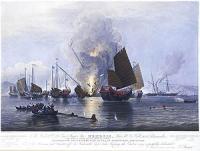
|
| Conflict | First Opium War | | Date | 18 March 1839 � 29 August 1842 | | Location | China | | Result | British victory; Treaty of Nanking | Territorial
changes | Hong Kong Island ceded to the United Kingdom | | UK United Kingdom
* British East India Company | | Qing Dynasty | Lord Palmerston,
Charles Elliot,
George Elliot,
James Bremer,
Hugh Gough,
Henry Pottinger,
William Parker | Daoguang Emperor,
Lin Zexu,
Qishan,
Guan Tianpei (KIA),
Yishan,
Yijing,
Yang Fang | | 19,000 troops | | Unknown total | 69 killed,
451 wounded | | 18,000 � 20,000 casualties |
|
|
The First Anglo-Chinese War (1839 - 42), known popularly as the First Opium War or simply the Opium War, was fought between the United Kingdom and the Qing Dynasty of China over their conflicting viewpoints on diplomatic relations, trade, and the administration of justice. Chinese officials wished to stop what was perceived as an outflow of silver and to control the spread of opium, and confiscated supplies of opium from British traders. The British government, though not denying China's right to control imports, objected to this seizure and used its newly developed military power to enforce violent redress. In 1842, the Treaty of Nanking-the first of what the Chinese later called the unequal treaties-granted an indemnity to Britain, the opening of five treaty ports, and the cession of Hong Kong Island, thereby ending the trade monopoly of the Canton System. The failure of the treaty to satisfy British goals of improved trade and diplomatic relations led to the Second Opium War (1856 � 60). The war is now considered in China as the beginning of modern Chinese history.
|
|
|